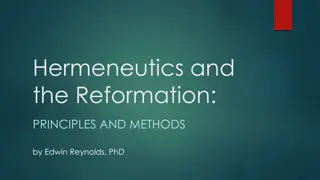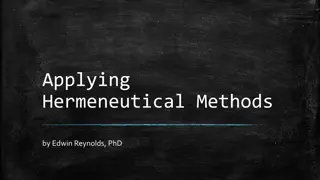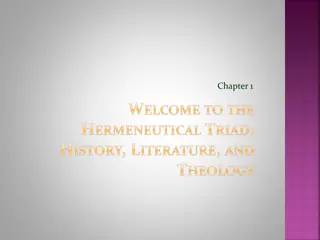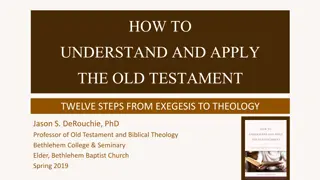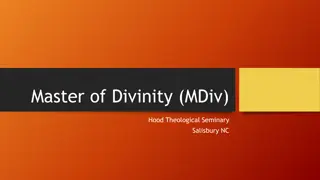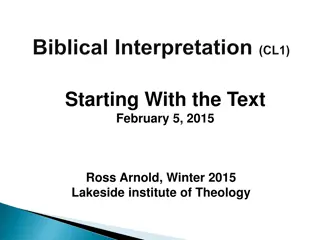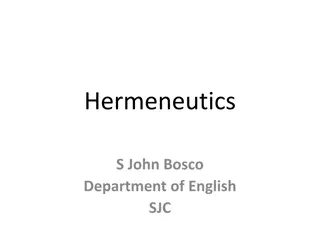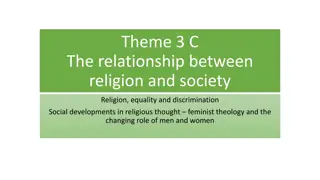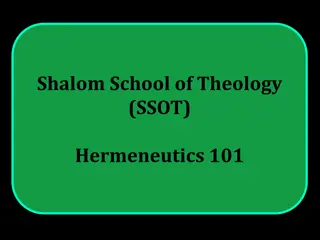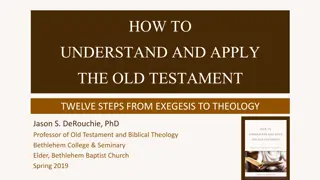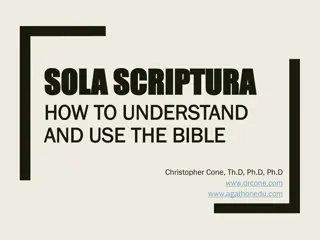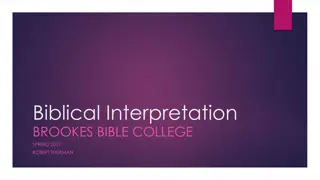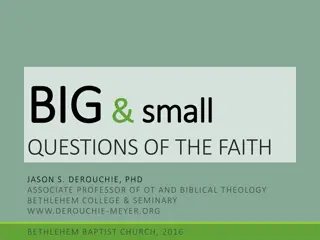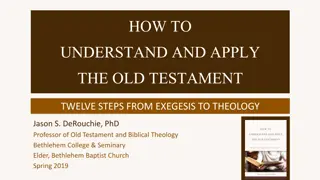Understanding Hermeneutics at Shalom School of Theology (SSOT) through General Principles and Biblical Examples
Explore the foundational principles of hermeneutics at Shalom School of Theology (SSOT) with a focus on identifying literary genres, understanding context, and interpreting plain meanings using examples from the Bible such as John 3:9 and John 21:15-17. Gain insights into the proper interpretation of biblical texts through grammatical analysis and semantic considerations.
Download Presentation

Please find below an Image/Link to download the presentation.
The content on the website is provided AS IS for your information and personal use only. It may not be sold, licensed, or shared on other websites without obtaining consent from the author. Download presentation by click this link. If you encounter any issues during the download, it is possible that the publisher has removed the file from their server.
E N D
Presentation Transcript
Shalom School of Theology (SSOT) Hermeneutics 101
General Hermeneutics 1. What Kind Of Passage Is This? (Type of literature genre) Is it history? Is it poetry? Is it prophecy? 2. What Is The Context? The Room the Biblical Context The House the Historical Context The Street the Cultural Context
General Hermeneutics 3. What Is The Plain Meaning? What is the grammatical sense? 1 JOHN 3:9 (NKJV, ESV, NASB, NIV)
General Hermeneutics 3. What Is The Plain Meaning? What is the grammatical sense? What is the normal meaning of the word? The word love, for example, has a limited range of possible meanings: intense affectionate concern, intense sexual desire, strong fondness, a zero score in tennis, a complimentary close of a letter, an affectionate nickname, and so on. The word love can possess any of these meanings and several more as well that fall within the parameters of its semantic range. But it cannot mean cheeseburger or dandruff.
General Hermeneutics 3. What Is The Plain Meaning? What is the grammatical sense? What is the normal meaning of the word? JOHN 21:15-17 ~ 15So when they had eaten breakfast, Jesus said to Simon Peter, Simon, son of Jonah, do you love Me more than these? He said to Him, Yes, Lord; You know that I love You. He said to him, Feed My lambs. 16 He said to him again a second time, Simon, son of Jonah, do you love Me? He said to Him, Yes, Lord; You know that I love You. He said to him, Tend My sheep. 17 He said to him the third time, Simon, son of Jonah, do you love Me? Peter was grieved because He said to him the third time, Do you love Me? And he said to Him, Lord, You know all things; You know that I love You. Jesus said to him, Feed My sheep.
General Hermeneutics 3. What Is The Plain Meaning? What is the grammatical sense? What is the normal meaning of the word? JOHN 21:15-17 ~ 15So when they had eaten breakfast, Jesus said to Simon Peter, Simon, son of Jonah, do you love Me more than these? He said to Him, Yes, Lord; You know that I love You. He said to him, Feed My lambs. 16 He said to him again a second time, Simon, son of Jonah, do you love Me? He said to Him, Yes, Lord; You know that I love You. He said to him, Tend My sheep. 17 He said to him the third time, Simon, son of Jonah, do you love Me? Peter was grieved because He said to him the third time, Do you love Me? And he said to Him, Lord, You know all things; You know that I love You. Jesus said to him, Feed My sheep. agapao
General Hermeneutics 3. What Is The Plain Meaning? What is the grammatical sense? What is the normal meaning of the word? JOHN 21:15-17 ~ 15So when they had eaten breakfast, Jesus said to Simon Peter, Simon, son of Jonah, do you love Me more than these? He said to Him, Yes, Lord; You know that I love You. He said to him, Feed My lambs. 16 He said to him again a second time, Simon, son of Jonah, do you love Me? He said to Him, Yes, Lord; You know that I love You. He said to him, Tend My sheep. 17 He said to him the third time, Simon, son of Jonah, do you love Me? Peter was grieved because He said to him the third time, Do you love Me? And he said to Him, Lord, You know all things; You know that I love You. Jesus said to him, Feed My sheep. agapao philo
General Hermeneutics 3. What Is The Plain Meaning? What is the grammatical sense? What is the normal meaning of the word? JOHN 21:15-17 ~ 15So when they had eaten breakfast, Jesus said to Simon Peter, Simon, son of Jonah, do you love Me more than these? He said to Him, Yes, Lord; You know that I love You. He said to him, Feed My lambs. 16 He said to him again a second time, Simon, son of Jonah, do you love Me? He said to Him, Yes, Lord; You know that I love You. He said to him, Tend My sheep. 17 He said to him the third time, Simon, son of Jonah, do you love Me? Peter was grieved because He said to him the third time, Do you love Me? And he said to Him, Lord, You know all things; You know that I love You. Jesus said to him, Feed My sheep. agapao philo
General Hermeneutics 3. What Is The Plain Meaning? What is the grammatical sense? What is the normal meaning of the word? JOHN 21:15-17 ~ 15So when they had eaten breakfast, Jesus said to Simon Peter, Simon, son of Jonah, do you love Me more than these? He said to Him, Yes, Lord; You know that I love You. He said to him, Feed My lambs. 16 He said to him again a second time, Simon, son of Jonah, do you love Me? He said to Him, Yes, Lord; You know that I love You. He said to him, Tend My sheep. 17 He said to him the third time, Simon, son of Jonah, do you love Me? Peter was grieved because He said to him the third time, Do you love Me? And he said to Him, Lord, You know all things; You know that I love You. Jesus said to him, Feed My sheep. agapao philo
General Hermeneutics 3. What Is The Plain Meaning? What is the grammatical sense? What is the normal meaning of the word? JOHN 21:15-17 ~ 15So when they had eaten breakfast, Jesus said to Simon Peter, Simon, son of Jonah, do you love Me more than these? He said to Him, Yes, Lord; You know that I love You. He said to him, Feed My lambs. 16 He said to him again a second time, Simon, son of Jonah, do you love Me? He said to Him, Yes, Lord; You know that I love You. He said to him, Tend My sheep. 17 He said to him the third time, Simon, son of Jonah, do you love Me? Peter was grieved because He said to him the third time, Do you love Me? And he said to Him, Lord, You know all things; You know that I love You. Jesus said to him, Feed My sheep. agapao philo 2 TIMOTHY 4:10a ~ for Demas has forsaken me, having loved this present world . . . JOHN 15:9 ~ As the Father loved Me, I also have loved you; abide in My love. JOHN 5:20 ~ For the Father loves the Son, and shows Him all things that He Himself does; and He will show Him greater works than these, that you may marvel.
General Hermeneutics 3. What Is The Plain Meaning? What is the grammatical sense? What is the normal meaning of the word? How are the words used in this passage and elsewhere by the same author? LUKE 14:26 ~ If anyone comes to Me and does not hate his father and mother, wife and children, brothers and sisters, yes, and his own life also, he cannot be My disciple. LUKE 16:13 ~ No servant can serve two masters; for either he will hate the one and love the other, or else he will be loyal to the one and despise the other. You cannot serve God and mammon.
General Hermeneutics 3. What Is The Plain Meaning? What is the grammatical sense? What is the normal meaning of the word? How are the words used in this passage and elsewhere by the same author? LUKE 14:26 ~ If anyone comes to Me and does not hate his father and mother, wife and children, brothers and sisters, yes, and his own life also, he cannot be My disciple. LUKE 16:13 ~ No servant can serve two masters; for either he will hate the one and love the other, or else he will be loyal to the one and despise the other. You cannot serve God and mammon. to contemn, despise, disdain, think little or nothing of
General Hermeneutics 3. What Is The Plain Meaning? What is the grammatical sense? What is the normal meaning of the word? How are the words used in this passage and elsewhere by the same author? ISAIAH 9:6 ~ For unto us a Child is born, unto us a Son is given; and the government will be upon His shoulder. And His name will be called Wonderful, Counselor, Mighty God, Everlasting Father, Prince of Peace. ISAIAH 10:21 ~ The remnant will return, the remnant of Jacob, to the Mighty God.
General Hermeneutics 3. What Is The Plain Meaning? What is the grammatical sense? What is the normal meaning of the word? How are the words used in this passage and elsewhere by the same author? How are the words used outside the Bible? What does the rest of the Bible say about this matter? 1 KINGS 17:1 JAMES 5:17
General Hermeneutics 3. What Is The Plain Meaning? What is the grammatical sense? What is the normal meaning of the word? How are the words used in this passage and elsewhere by the same author? How are the words used outside the Bible? What does the rest of the Bible say about this matter? What do the commentaries say?
General Hermeneutics 4. Are we dealing with figures of speech? Is it a simile? 1 PETER 5:8 ~ Be sober, be vigilant; because your adversary the devil walks about like a roaring lion, seeking whom he may devour. PSALM 92:12 ~ The righteous shall flourish like a palm tree, he shall grow like a cedar in Lebanon.
General Hermeneutics 4. Are we dealing with figures of speech? Is it a simile? Is it a metaphor? LUKE 13:32 ~ And He said to them, Go, tell that fox, Behold, I cast out demons and perform cures today and tomorrow, and the third day I shall be perfected. PSALM 18:2 ~ The Lord is my rock and my fortress and my deliverer; My God, my strength, in whom I will trust; My shield and the horn of my salvation, my stronghold. ** SOME EXERCISES**


